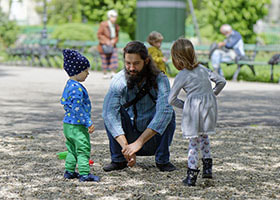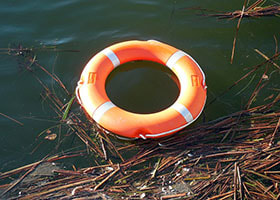|
By Sybil Cummin, MA, LPC, ACS  Violence in the home affects all that live there, especially the youngest ones who have no escape. In these cases, it can be helpful to have Child Protective Services (CPS) involved to help monitor and maintain safety for the children in the home. CPS can provide resources for housing, childcare, mental health services, and supervised visitation monitoring for the abusive parent/partner. In theory, these services will help the non-abusive parent leave the relationship and find safety for themselves and children; however, this is not always the case. And what about the cases that never make it onto the radar of CPS? Family Court, due to divorce and custody issues, is also commonly involved with these families. Many times when judges are trying to determine what is in the best interest of the children, supervised visitation can be ordered to help monitor and assess the safety of a parent. The goal is to do what is in the best interest of the children; unfortunately, this is also not always the case. If your facilitator does not have the proper education and understanding of domestic violence, these supervised visitations can allow abuse to continue.
0 Comments
“Based on what you have shared with me today, I am going to have to call Child Protective Services.”10/15/2020 By Sybil Cumming, MA, LPC, ACS  “Based on what you have shared with me today, I am going to have to call Child Protective Services.” This sentence will put the fear of God into any parent’s heart. “They are going to take my children” may be the first coherent thought after that gut-wrenching feeling. It doesn’t matter if you have had experiences with child protective services (CPS) in the past or if you have never even known anyone who has had any contact with them before. This sounds scary. As mandated reporters, it is our job to call CPS if we suspect that there is a situation when children are being put in harm’s way. It is not our job to investigate the situation and make the determination if, in fact, these children are at risk for abuse, neglect, or even death. It is solely our job to make the phone call. By Sybil Cummin, MA, LPC, ACS Note: While the statistics show that males perpetrate violence towards females at a much higher rate, women can also perpetrate domestic violence.  While our family court systems say their decisions are based on the best interests of the children, the evidence proves otherwise. Research suggests that in an estimated 30 to 60 percent of the families where domestic violence is identified, some form of co-occurring child maltreatment is also present (Children’s Hospital of Philadelphia Center for Injury Research and Prevention). One North American study found that children who were exposed to domestic violence were 15 times more likely to be physically and/or sexually abused than the national average (Volpe, 1996). And yet, domestic violence is not a major factor in determining who has access to unsupervised time with the children. I have several clients who have shared that attorneys have told them NOT to say anything about their experiences of domestic violence during family court proceedings as there are typically WORSE outcomes regarding parenting time and decision making for those who report the violence they have experienced. And as I talk with other professionals working with victims of domestic violence, this is not a small issue that is isolated to my community. Talking about domestic violence is considered the “kiss of death” by many family court attorneys. By Sybil Cummin, MA, LPC, ACS In this video, Sybil discusses how clinicians and attorneys can best support clients, who have experienced abuse, navigate the legal system, particularly when Orders of Protection have been broken. For more videos, visit our Videos page or check out the Beyond Power and Control YouTube Channel.
By Sybil Cummin, MA, LPC, ACS  1. Taking Control of the Timeline of the Case If your client is hesitant or fearful to testify, their abuser knows it. How can the abuser use this to their advantage? They can use different tactics to continue the case. Some of these cases take over a year for the jury trial to occur, forcing your client to show up to court each time, experiencing all of the anxiety that occurs with this, only to find out that the case will be continued for another 6-8 weeks. This can happen numerous times for numerous reasons. This also effects other potential witnesses.  Spirituality is a source of comfort, guidance, meaning and purpose for many people. However, for many survivors of domestic violence, misguided religious messages can be used to justify abuse and coerce victims to submit and accept maltreatment, coercion, cruelty, neglect and/or violence. Spiritual abuse is an insidious form of trauma and psychological manipulation that uses religious doctrine to control community members and keep them subjugated. When spiritually toxic environments intersect with domestic violence, often scripture is used to embolden abusers. Often times, scripture that alludes to women being required by God to be submissive or “fulfill their wifely duties” is used to force victims – women especially – to submit to their abuser. Worse yet, many survivors who report their abuse to practicing family or community members, are often turned away and told to “pray, submit, and be a good wife.” This is a powerful form of victim blaming and makes leaving a domestically violent relationship that much more heartbreaking. By Sybil Cummin, MA, LPC, ACS  Domestic violence (DV) is one of the silent epidemics in our culture today. It is not well understood by the larger system that these couples will come into contact, let alone understood by the public and those who have not experienced DV. And even when you have experienced DV in a relationship, if you do not have the resources and support to understand what has happened to you, you can be left completely confused or believing what your abusive partner has spewed as truth. When 1 in 4 women and 1 in 9 men have experienced severe forms of physical violence in an intimate relationship(1), why is it not better understood? One of the misconceptions or myths that is consistently used to defend abusive behaviors is that abusive partners “just have an anger problem.” If an abusive act is witnessed by others or called out in any fashion, the excuse that they have a problem controlling their anger is a go-to response. And, this excuse is routinely believed to be the cause of the behaviors. This makes sense to those who have witnessed a single abusive act or those in the system that do not have enough knowledge on the history of the coercive control that has been used throughout the length of the relationship. It is even an acceptable excuse for many victims feeling the wrath of this so-called anger problem. So, can DV just be explained as poor impulse control or difficulties controlling anger? By Sybil Cummin, MA, LPC, ACS  Victims and survivors of intimate partner violence (IPV) are questioned and discredited by those that are supposed to help keep them safe. Here are some statements made by victims and survivors of IPV that they would like therapists and other professionals to know before working with this population. “Abusers make sure they seem like good people so that if their victims speak up not one will believe it” -K |
AuthorSybil Cummin, MA, LPC, ACS Archives
February 2021
Categories
All
|
